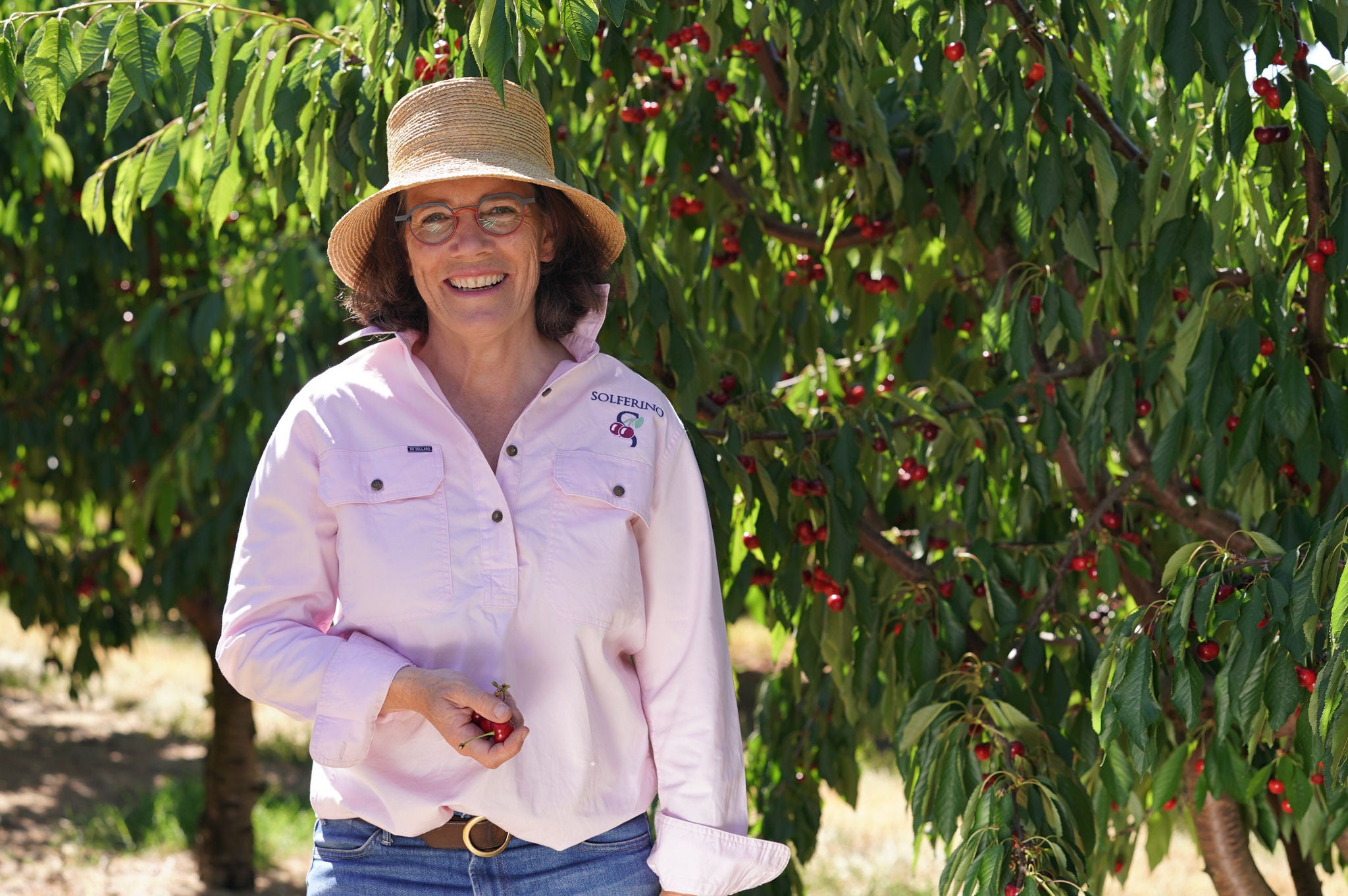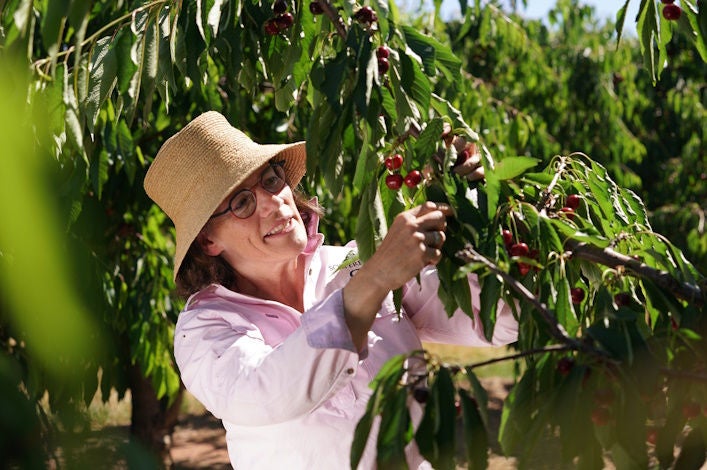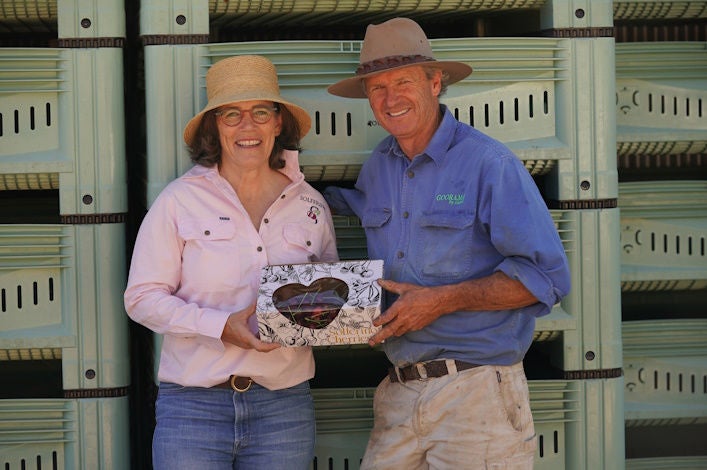Posted by on
22/11/2023
Cherry season is just around the corner, and for orchardist Samantha Flanery, that sweet crunch through the glossy fruit is synonymous with joy.
"I get excited about cherries as we don't have them all year round, they're so specific to the time when the whole of Australia relaxes and has family time, they really are associated with fun, vacations, and happy times."
However, the production of cherries is certainly not for the faint-hearted, a fact Samantha and her husband Tony have discovered over the past four years since purchasing an orchard in Young, NSW.
“We took over the property a week before harvest in 2019 and no sooner Covid hit, so it was a very interesting introduction, to say the least."
A run of wet seasons also limited production, with rain splitting fruit and sodden soil leading to the loss of trees, however so far the stars have aligned for the coming harvest.
“The current season is positive, we've had the winter chill hours required for sweetness, and lovely spring rain, and the cherry trees are responding, carrying an exciting full load.”
Young, situated on the NSW South West Slopes, is a prime cherry growing region, benefitting from rich soils, an advantageous climate, and an altitude high enough to achieve fruit sweetness.
In Australia, cherries are considered a premium product, a summer-time treat over the Christmas or holiday season, and as such, much of Australia's production is exported to Asia and the Middle East.
“There’s enormous international demand for our Australian cherries, and thanks to air freight they can be in Asia just 72 hours after they’re picked, with these consumers more inclined to pay a premium,” Samantha explains.
An exciting new direction for a traditional mixed-farming operation

Samantha and Tony run a highly diversified operation, and for the past thirty years their main focus has been fine wool and lamb production in conjunction with broadacre cropping.
A run of dry seasons experienced between 2000 and 2019 prompted the couple to explore how they could use their limited amount of land more intensely, for increased production and further business growth.
“There’s only so much land people can buy that will sustain production during the dry times, hence our attraction to cherries. They do so well out here, and seemed like a valuable opportunity to balance our farming risk.”
After years of consideration, in 2019 they purchased another mixed farm, 35 kilometres from their home property, consisting of a beef feedlot, cropping opportunities, and an established cherry orchard with a water license.
While Tony had some previous experience growing dryland cherries, the couple admits they jumped into the deep end relatively blind.
“Ignorance really is bliss,” Samantha laughs.
From learning the correct pruning techniques for maximum production, to the natural pollination requirements of each variety, Samantha has embraced the new challenge hands-on, and with gusto.
"Growing cherries is a delicate balance of nature and science. The correct pruning and nutrition schedule is critical to the following year’s production, and as bud development occurs pretty much as soon as the cherries are picked, there really is limited downtime.”
Harvest ends around Christmas time, with pruning beginning in February.
The Flanerys grow ten different cherry varieties, each with its own genetics and unique pollination requirements – a further aspect of production facilitating newfound knowledge and skills.
And despite the enormous learning curve, Samantha is clearly thrilled and believes expanding into a new enterprise has reinvigorated the couple – both professionally and personally.
“We’re so excited by the cherries, they’ve given us a real boost and we feel really re-energised. Tony and I love talking business and bouncing ideas – it’s been great for our relationship, but as one can imagine, not without its challenges!”
Excited to contribute to the Australian cherry industry
Their ‘fresh-eyed’ approach is also spearheading innovation and progression within the industry, with Samantha’s seemingly boundless energy driving new techniques and ideas.
With 8,000 existing mature and productive trees, the Flanerys’ are in the process of expanding the orchard by 20,000 – planting an additional 4,000 trees each year.
“Eventually it will be a significant orchard, but we’re taking our time, it’s capital intensive and risky so we want to make sure we can solidify our decision-making annually and look after the trees we have.”
The couple has also invested heavily in automated irrigation and fertigation, whereby nutrients are integrated into the irrigation system and dripped onto trees, controlled remotely.
Used extensively in the almond industry, the Flanerys’ have adopted a Phytech irrigation system across their orchard which has extensive tree monitoring capabilities to ensure optimal water use efficiency.
“This innovation allows us to measure and control the flow of water remotely, assess the expansion of trunks for stress and water use, and adapt accordingly.”
“Essentially it can read the trees so that we can provide them with the exact amount of water that they need.”
Visual observation is still extremely important, with Samantha quoting retired local cherry producer and mentor Geoff Hall, “Trees grow better in their owner's shadow."
“We lost a lot of trees last year, they can’t breathe in sodden soil – as a result, we have young trees mixed in with old which is a challenge, so we must maintain constant attention to detail when watering our trees.”
Growing ten varieties enables staggered fruit production throughout the growing season, however, come harvest time it's one month of pure intensity.
Harvest begins in mid-November, ensuring cherries are adorning tablescapes throughout the festive season.
All fruit is hand-picked, hydro cooled and placed in cold storage within the hour, before it’s shipped to the local pack house, Back Creek Orchard, where it is packed for customer and export orders.
The Flanery family has spent the past four years planting new trees, and this harvest they will enjoy the fruits of their labour, with the Santina Cherries they planted two years ago now blooming.
"Fruit only grows on second-year wood – which is why it’s so important to encourage strong second-year wood when pruning – and it’s really exciting that first flush on our newer trees.”
While the Santina variety is considered the sweetest, Samantha’s favourite is Rons cherries – an old variety, large and heart-shaped with black flesh and a juicy deep red flesh.
“I just adore cherries, I go into the orchard and eat them off the tree, testing them for firmness and sweetness, and it really is a joy.”
Encouraging greater local consumption

Samantha would like to see the day when cherries are a summer staple, rather than a premium product, and has just signed off on new branding and innovative packaging for their brand, Solferino Cherries.
“Personally, I don’t want to pay for squashed cherries in the bottom of the traditional bag, so I've designed a two-layered box, with a see-through lid so the cherries really can sell themselves.”
“They will look stunning to the consumer, and reduce wastage, so it’s really exciting – we’ll see how it goes, I’m certainly no marketing guru, but I’ve been buying cherries for decades, and I know this is how I would like my cherries presented.”
Solferino Cherries are sold through Coles supermarkets, as well as on the Brisbane and Sydney market flood and into the Asian market, with the early varieties due to hit supermarket shelves mid-November.
Executive Development Program underpins confidence in new enterprise
Currently halfway through Rabobank’s Executive Development Program (EDP), Samantha laughs that their extremely diverse operation flies in the face of most sound business advice.
“In business, you’re generally encouraged to focus on the thing you do well and drill down on that, however, our approach certainly makes us both very busy!”
Samantha, a former lawyer and later a full-time mother to four daughters, said the opportunity to expand came just at a time when she was looking for something to invest her time and passion into.
"My youngest daughter had just finished high school, and I'd been helping Tony on our broadacre operation, but I felt like I needed something to sink my teeth into."
“I manage the day-to-day operation, with huge support from Tony, and it’s been wonderful.”
The business growth also coincided with the EDP, something she admits she should have done years ago, yet acknowledges that – as it’s transpired – now is the perfect time to participate in the in-depth business program.
“The EDP has been terrific and as we venture into this new enterprise it’s opened our minds, and our network to other interesting farmers – from hemp growers to New Zealand orchardists, and it’s wonderful learning together and from each other.”
“It also provides the opportunity for continual education and updated best practice, which Tony and I have always been keen to explore and adopt.”
“Learning as she goes”, Samantha is also grateful for Geoff Hall, who came out of retirement to assist as their on-farm consultant.
"Geoff has been wonderful, and has given me enormous confidence in what I'm doing – I realised very early on that I really didn't know enough to be running an orchard!"
“What we noticed about the industry is that there is not a lot of knowledge-sharing, particularly in the form of trial work and education, which, while challenging, also gives us an exciting opportunity for growth.”
Existing staff retained on the property have also provided a wealth of knowledge, and she described the operation as a genuine team effort.
It also coexists with their traditional operation surprisingly well.
“Tony has been home since finishing university, so our original property is well and truly a mature operation, and some staff have been with us for 30 years now, so it’s an enterprise that almost runs itself.”
“We just always hope that cherry picking and the canola harvest don’t coincide come November – then we’ll really know we’re alive.”
Looking to the next generation

With their daughters now aged between 19 and 27, Samantha said the family was starting to talk about what the future looks like.
"The girls all love agriculture, they can drive a chaser bin and drench a sheep and have always been very hands-on. This new enterprise also provides increased options for the family going forward.”
Rabobank, and their rural managers Craig and Virginia Croker, have also been supporting their growth, and helping shape their future, and Samantha describes their relationship as “productive, ongoing and relaxed.”
“Rabobank has been so encouraging of our expansion into a new industry, they understand that it’s going to take time, and they’re willing to give us that time – but we also all understand that we need to be profitable, so we take a disciplined approach.”
“It’s an ongoing information loop between Craig, Virginia, and ourselves, we keep them up to date the whole time, and they come out during harvest and the growing season, they genuinely share our excitement and it’s a wonderful partnership.”
